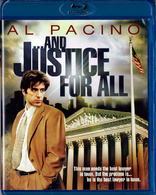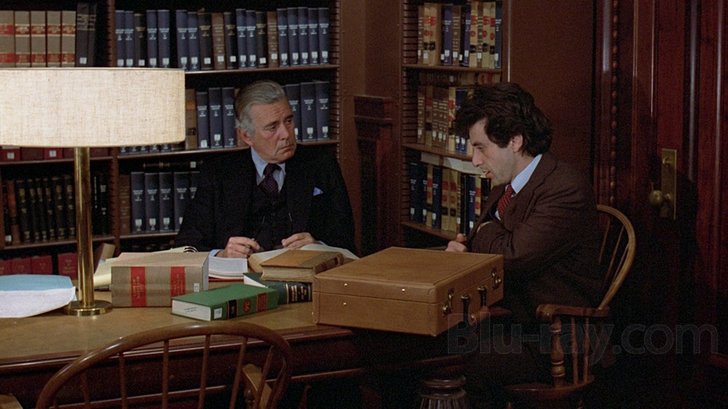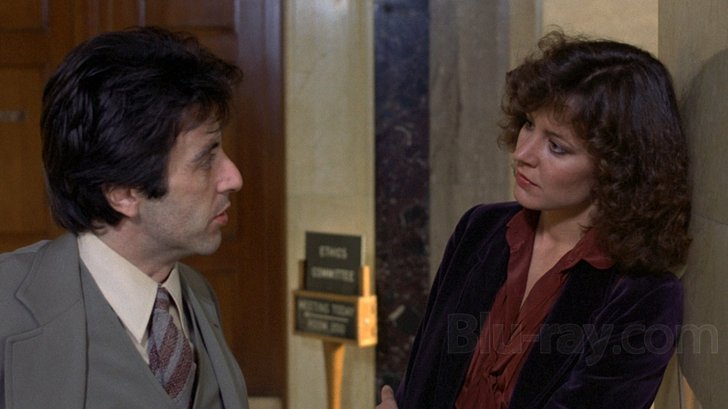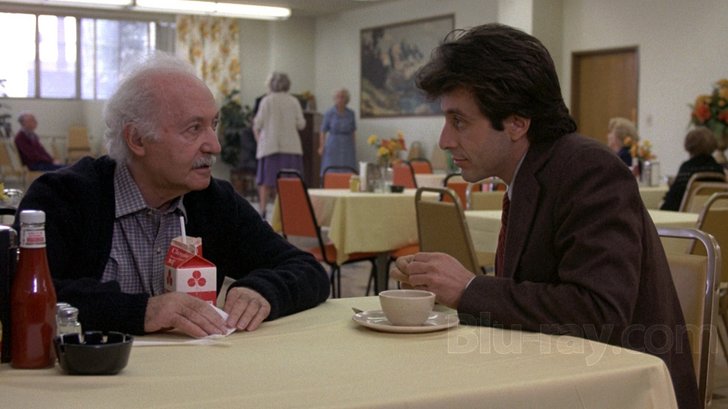And Justice for All Blu-ray Movie
HomeAnd Justice for All Blu-ray Movie 
...And Justice for AllImage Entertainment | 1979 | 119 min | Rated R | Apr 05, 2011

Movie rating
7.2 | / 10 |
Blu-ray rating
| Users | 4.0 | |
| Reviewer | 3.0 | |
| Overall | 3.0 |
Overview
And Justice for All (1979)
An idealistic defense lawyer struggles with the challenges of life in the trenches of the criminal justice system.
Starring: Al Pacino, Jack Warden, John Forsythe, Lee Strasberg, Jeffrey TamborDirector: Norman Jewison
| Drama | Uncertain |
| Thriller | Uncertain |
| Crime | Uncertain |
Specifications
Video
Video codec: MPEG-4 AVC
Video resolution: 1080p
Aspect ratio: 1.78:1
Original aspect ratio: 1.85:1
Audio
English: DTS-HD Master Audio 5.1 (48kHz, 16-bit)
Subtitles
English SDH, Spanish
Discs
25GB Blu-ray Disc
Single disc (1 BD)
Playback
Region A (locked)
Review
Rating summary
| Movie | 2.0 | |
| Video | 4.0 | |
| Audio | 1.5 | |
| Extras | 1.0 | |
| Overall | 3.0 |
And Justice for All Blu-ray Movie Review
Who's out of order?
Reviewed by Michael Reuben June 14, 2011Norman Jewison's . . . And Justice for All (hereafter "AJFA") tried to appraise the justice system
the way Network examined television three years earlier. It applied the same absurdist slant, set
its emotional pitch at the same height, and conveyed the same sense, in the words of Al Pacino's
idealistic protagonist, that something was "really wrong here". I have great affection for the film,
as I do for almost all of Pacino's work from the 1970s, because he was electrifying in everything
he did then. Jewison's camera, shooting in Baltimore with a script written by Barry Levinson and
then-wife Valerie Curtin, captured the authentic, gritty feel of everyday life in a major
metropolitan courthouse as no other film has before or since. It's a reality that decades of TV
lawyer shows have sanitized (with the exception of Sidney Lumet's criminally underseen 100
Centre Street).
But grit and Pacino do not a good movie make. AJFA remains a guilty pleasure, but it's a terrible
movie. It bears about as much relation to the criminal justice system it claims to be exposing as
Roadhouse does to the life of a bouncer. You'll meet Patrick Swayze's Dalton long before you'll
encounter any lawyers and judges like those in AJFA.

As in Serpico, Pacino plays the honorable man in a corrupt and crumbling system. But Pacino's Arthur Kirkland is no rookie. A familiar figure in Baltimore's main courthouse, Arthur is an established lawyer with a successful practice and an expert at navigating the bazaar of horse-trading and plea bargaining that the halls of justice have become. The bread and butter of his practice are clients who can pay, people like Carl Travers (Dominic Chianese, reuniting with Pacino after Godfather II), a shifty character who always seems to be in trouble.
But Arthur's heart lies with clients whose need for counsel is truly desperate, like young Jeff McCullaugh (Thomas Waites), who was pulled over for a broken tail light and, through misidentification and a series of miscarriages of justice, got sentenced to hard time for a crime he didn't commit. Arthur has spent a year assembling evidence to exonerate McCullaugh, but the sentencing judge, Henry T. Fleming (John Forsythe), rejected it, because Arthur submitted it past the statutory deadline. Judge Fleming is a stickler, a strict "law and order" man. He and Arthur have squared off repeatedly, but the McCullaugh case is their worst confrontation yet.
Even the more reasonable judges are crazy. A prime example is Judge Francis Rayford (Jack Warden), a Korean War veteran who wears a gun under his robes and is addicted to the adrenaline rush of near-death experiences. Arthur can't understand why a judge like Rayford is allowed to go on making decisions about people's lives, while a recently convened ethics panel led by William Zinoff (Darrell Zwerling) is expending time and effort conducting a witch hunt for seemingly non-existent offenses committed by lawyers. However, Arthur's distaste for the panel doesn't stop him from asking out its sole female member, Gail Packer, because she's played by a young Christine Lahti, who's too beautiful to overlook. (She says yes.)
Arthur is a rarity among the lawyers loitering in the courthouse halls. Most are there solely for the money, like Arthur's friend Warren (Larry Bryggman), who's so preoccupied with his cut of a real estate transaction that he's late for a sentencing Arthur needs him to cover, with dire consequences. Others are in it for the glory, like the district attorney, Frank Bowers (Craig T. Nelson), for whom the courtroom is a football field where winning isn't everything, it's the only thing - and justice doesn't enter into it. Only Arthur's partner, Jay Porter (Jeffrey Tambor), seems to share some of his conscience. Unfortunately, he doesn't also share Arthur's thick skin. During the course of the film, things get to him that shouldn't, and he flips out.
This is not the world envisioned for Arthur by the beloved grandfather who raised him and put him through law school. But Grandpa Sam (Lee Strasberg, another Godfather II veteran and Pacino's acting teacher) is blessed with a failing memory that causes him to think Arthur is still in law school. During Arthur's weekly visits to the nursing home, Sam waxes rhapsodic about the law and reminds Arthur of what initially inspired him. Then it's back to reality.

AJFA sets out all the right elements for a trenchant critique of an overburdened system that's too busy scraping by to discharge its essential responsibility to see justice done "for all", as the Pledge of Allegiance provides. The McCullaugh storyline is especially compelling, and Pacino and Waites play their scenes effectively But the film's writers and director squander their opportunity with plot turns that send the story careering off in the wrong direction. The upright Judge Fleming is suddenly accused of a heinous crime, and Arthur is tapped to defend him - blackmailed, in fact, under threat of adverse action by Zinoff's ethics committee. The problem with this development is not that it's unrealistic, because there have been cases where sitting judges were accused of crimes, some of them serious. But as Arthur begins to prepare the defense of his former adversary (who, quite preposterously, manages to remain a sitting judge while charged with a felony and is tried in the same building where he holds court), the film begins to offer up cardboard villains and agitprop explanations for the ills it has portrayed.
Judge Fleming, you see, is a Rich Man. The film makes a point of showing you the mansion in which he lives. And like all rich men are assumed to be, he's connected to secret and powerful interests that control the world so that things are "taken care of" for him. By the time the film reaches its conclusion, Judge Fleming will have been revealed as a hypocrite who applies one set of rules to the rest of the world and another to himself and his fellow plutocrats. The sorry state of the justice system is down to him and his ilk.
What nonsense! Even in 1979, the vast majority of state court judges weren't wealthy, and those who were didn't get their money from public service. The situation has only become more extreme since then, as judicial salaries have lagged far behind the private sector. Some people become judges out of a genuine desire for public service. Some do it because it's their reward for political loyalty. And some do it because it's the only legal job they can get. But no one becomes a judge for the sake of keeping the rabble under control, as AJFA suggests Fleming did. AJFA would have been a superior and more durable film if the judge who kept Jeff McCullaugh in prison genuinely believed that the outcome was required by the rule of law. Then the film would have had to take that view seriously, instead of shrugging it off as a pretext by a moustache-twirling caricature (figuratively speaking, of course, since Fleming is clean shaven). More importantly, the film would have had to confront the real causes of the justice system's dysfunction.
Jewison and his screenwriters probably thought they were "following the money", but they took shortcuts and got lost. Their mistake was focusing on the courthouse in isolation, as if it functioned independently of law enforcement, the political class, various constituencies that routinely appear in court represented by counsel, including career criminals, and the general economy. Almost a quarter century later, David Simon and Ed Burns, a reporter and an ex-cop, would undertake such an examination, also set in Baltimore, in The Wire, and it took them five seasons of television. AJFA couldn't have covered all that ground, but it could at least have played fair with the arena it chose to portray. That it didn't is why, at the end, we're left sitting on the courthouse steps with Pacino's Arthur Kirkland, wondering what the hell just happened.
And Justice for All Blu-ray Movie, Video Quality 

Image's AVC-encoded Blu-ray does justice to Victor Kemper's cinematography for AJFA, which reflects Kemper's skill at getting the dirt and grime of Seventies cityscapes into the frame. (His other credits include Dog Day Afternoon, the underappreciated The Friends of Eddie Coyle and Eyes of Laura Mars.) The image may not "pop", but it's fully detailed, allowing the viewer to appreciate (or, as appropriate, recoil from) the full array of Seventies "fashions" on display in the courthouse and surrounding environs. Blacks are never fully black, but this is inherent to the source and is typical of a major city, where there are always multiple light sources, even at night. The predominant colors are browns and ochres, but I suspect this was dictated as much by the locations as by any design choices. (If you've seen enough courthouses built in the 19th or early 20th Centuries, you'll know what I mean.) The film's grain structure appears to be intact and undamaged by any kind of processing, and, while the grain is more prominent than in a typical contemporary production, it isn't excessive. The source material appears to be in very good condition, with little or no damage and only minor and occasional gate weave.
And Justice for All Blu-ray Movie, Audio Quality 

The film was released in mono, and so was the first DVD. The 5.1 remix included on the Blu-ray in DTS lossless demonstrates the virtues of leaving well enough alone. The mix remains entirely in the front three speakers, adding little in the way of spaciousness or ambiance. It does, however, add a hollow quality to the voices that can sound almost like an echo and is sometimes distracting. Sound effects don't have any more impact than they would through a single speaker, although Dave Grusin's jazzy score does gain more presence (it was probably recorded in stereo). This is one case where the original mix should have been offered as an option, preferably in lossless audio.
And Justice for All Blu-ray Movie, Special Features and Extras 

The Image Blu-ray omits the director's commentary included on the DVD released in 2001 by
Sony Pictures, and it doesn't include the interviews with Jewison and Levinson added when the
DVD was reissued in 2008 with a promotional short for 88 Minutes and the pilot episode of
Damages. The omission of the commentary is mystifying, since Image included it with their full-frame DVD released in Dec. 2010.
- Deleted Scene: Fleming's Office (SD; 1.78:1, enhanced; 2:43): The scene is introduced by footage of hands taking film out of a can and threading it through a projector. The scene then appears in the viewfinder, which expands to fill the screen.
- Trailer (SD; 1.33:1; 2:58): A memorable trailer that sold the film effectively.
The scene would have occurred early in the film. Arthur and Judge Fleming debate the McCullaugh case while the judge looks at slides of antiques. A piece of the scene appears in the film's trailer. Ultimately, I suspect the filmmakers decided that it was better to show less of Judge Fleming until later in the film.
And Justice for All Blu-ray Movie, Overall Score and Recommendation 

In nearly all of his Seventies films, Pacino seemed to be discovering acting anew. Everything he
did seemed to surprise him as much as it did the audience. There are long stretches of AJFA that
are worth seeing for the sheer excitement of Pacino being Arthur Kirkland and exploring how
that feels. The film also marked the final onscreen collaboration between Pacino and Lee
Strasberg, and their scenes together have a special poignancy. But substantively the film is
gibberish. I recommend renting first, especially since the soundtrack has issues.
Similar titles
Similar titles you might also like

If Beale Street Could Talk
2018

Beyond a Reasonable Doubt
2009

Sleepers
1996

Dead Man Walking
1995

The Paperboy
2012

Too Young to Die?
1990

The Girl Who Kicked the Hornet's Nest
Luftslottet som sprängdes
2009

The Man Who Fell to Earth
Limited Collector's Edition
1976

Blood Ties
2013

King of New York
1990

A Few Good Men 4K
25th Anniversary Edition
1992

12 Angry Men
1957

Misconduct
2016

High Crimes
2002

Syriana
2005

The Friends of Eddie Coyle
1973

Michael Clayton
2007

Damages: The Complete Series
2007-2012

The Informant! 4K
2009

Anatomy of a Murder
1959